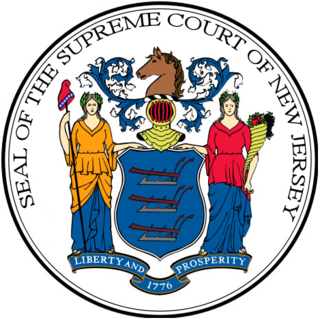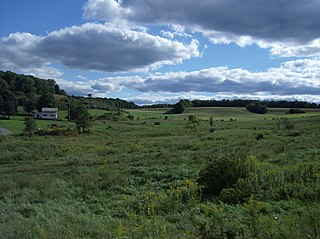
The Fourth Amendment to the United States Constitution is part of the Bill of Rights. It prohibits unreasonable searches and seizures and sets requirements for issuing warrants: warrants must be issued by a judge or magistrate, justified by probable cause, supported by oath or affirmation, and must particularly describe the place to be searched and the persons or things to be seized.
In United States criminal law, probable cause is the legal standard by which police authorities have reason to obtain a warrant for the arrest of a suspected criminal and for a court's issuing of a search warrant. One definition of the standard derives from the U.S. Supreme Court decision in the case of Beck v. Ohio (1964), that probable cause exists when “whether at [the moment of arrest] the facts and circumstances within [the] knowledge [of the police], and of which they had reasonably trustworthy information, [are] sufficient to warrant a prudent [person] in believing that [a suspect] had committed or was committing an offense.”

The Supreme Court of New Jersey is the highest court in the U.S. state of New Jersey. In its current form, the Supreme Court of New Jersey is the final judicial authority on all cases in the state court system, including cases challenging the validity of state laws under the state constitution. It has the sole authority to prescribe and amend court rules and regulate the practice of law, and it is the arbiter and overseer of the decennial legislative redistricting. One of its former members, William J. Brennan Jr., became an associate justice of the Supreme Court of the United States.

The open-fields doctrine, in the U.S. law of criminal procedure, is the legal doctrine that a "warrantless search of the area outside a property owner's curtilage" does not violate the Fourth Amendment to the United States Constitution. However, "unless there is some other legal basis for the search," such a search "must exclude the home and any adjoining land that is within an enclosure or otherwise protected from public scrutiny."
Reasonable suspicion is a legal standard of proof in United States law that is less than probable cause, the legal standard for arrests and warrants, but more than an "inchoate and unparticularized suspicion or 'hunch'"; it must be based on "specific and articulable facts", "taken together with rational inferences from those facts", and the suspicion must be associated with the specific individual. If police additionally have reasonable suspicion that a person so detained is armed and dangerous, they may "frisk" the person for weapons, but not for contraband like drugs. However, if the police develop probable cause during a weapons frisk, they may then conduct a full search. Reasonable suspicion is evaluated using the "reasonable person" or "reasonable officer" standard, in which said person in the same circumstances could reasonably suspect a person has been, is, or is about to be engaged in criminal activity; it depends upon the totality of circumstances, and can result from a combination of particular facts, even if each is individually innocuous.
Illinois v. Caballes, 543 U.S. 405 (2005), is a decision by the Supreme Court of the United States in which the Court held that the use of a drug-sniffing police dog during a routine traffic stop does not violate the Fourth Amendment to the U.S. Constitution, even if the initial infraction is unrelated to drug offenses.
South Dakota v. Opperman, 428 U.S. 364 (1976), elaborated on the community caretaking doctrine. Under the Fourth Amendment, "unreasonable" searches and seizures are forbidden. In addition to their law-enforcement duties, the police must engage in what the court has termed a community caretaking role, including such duties as removing obstructions from roadways to ensure the free flow of traffic. When the police act in this role, they may inventory cars they have seized without "unreasonably" searching those cars.

Piscataway High School is a four-year comprehensive community public high school serving students in ninth through twelfth grades from Piscataway in Middlesex County, in the U.S. state of New Jersey, operating as the lone secondary school of the Piscataway Township Schools. The school is accredited by the New Jersey Department of Education and has been accredited by the Middle States Association of Colleges and Schools Commission on Elementary and Secondary Schools since 1963. Piscataway Township High School is known for its football program; three former players were drafted in the first round of the National Football League draft in two years, the first time in history that such an event has occurred.
Vernonia School District 47J v. Acton, 515 U.S. 646 (1995), was a U.S. Supreme Court decision which upheld the constitutionality of random drug testing regimen implemented by the local public schools in Vernonia, Oregon. Under that regimen, student-athletes were required to submit to random drug testing before being allowed to participate in sports. During the season, 10% of all athletes were selected at random for testing. The Supreme Court held that although the tests were searches under the Fourth Amendment, they were reasonable in light of the schools' interest in preventing teenage drug use.
Ker v. California, 374 U.S. 23 (1963), was a case before the United States Supreme Court, which incorporated the Fourth Amendment's protections against illegal search and seizure. The case was decided on June 10, 1963, by a vote of 5–4.
Daniel Joseph O'Hern was a former associate justice of the New Jersey Supreme Court, where he served from August 6, 1981, until his retirement upon his 70th birthday.
Wilson v. Arkansas, 514 U.S. 927 (1995), is a United States Supreme Court decision in which the Court held that the traditional, common-law-derived "knock and announce" rule for executing search warrants must be incorporated into the "reasonableness" analysis of whether the actual execution of the warrant is/was justified under the 4th Amendment. The high court thus ruled that the old "knock and announce" rule while not a hard requirement, was also not a dead letter.
Wyoming v. Houghton, 526 U.S. 295 (1999), is a United States Supreme Court case which held that absent exigency, the warrantless search of a passenger's container capable of holding the object of a search for which there is probable cause is not a violation of the Fourth Amendment to the United States Constitution because it is justified under the automobile exception as an effect of the car.
Safford Unified School District v. Redding, 557 U.S. 364 (2009), was a case in which the Supreme Court of the United States held that a strip search of a middle school student by school officials violated the Fourth Amendment to the U.S. Constitution, which prohibits unreasonable searches and seizures.
Almeida-Sanchez v. United States, 413 U.S. 266 (1973), was a United States Supreme Court case holding that the search of an automobile by the United States Border Patrol without a warrant or probable cause violates the Fourth Amendment. The vehicle was stopped and searched for illegal aliens twenty-five miles (40 km) from the Mexican border. The Court approached the search from four views: automobile search, administrative inspection, heavily regulated industry inspection, and border search. As to the validity of the search under the automobile exception, the Court found no justification for the search under the Carroll doctrine because there was no probable cause. As to the validity of the search under various administrative inspection doctrines, the Court found that the officers lacked an area warrant. As to the validity of the heavily regulated industry inspection, the Court found that the doctrine is not applicable to traveling on a state highway. As to the validity of a border search, the Court found that the site of the stop and the entirety of the road on which the stop occurred was too far from the border to be considered a border search.
Whren v. United States, 517 U.S. 806 (1996), was a unanimous United States Supreme Court decision that "declared that any traffic offense committed by a driver was a legitimate legal basis for a stop."
O'Connor v. Ortega, 480 U.S. 709 (1987), is a United States Supreme Court decision on the Fourth Amendment rights of government employees with regard to administrative searches in the workplace, during investigations by supervisors for violations of employee policy rather than by law enforcement for criminal offenses. It was brought by Magno Ortega, a doctor at a California state hospital after his supervisors found allegedly inculpatory evidence in his office while he was on administrative leave pending an investigation of alleged misconduct. Some of what they uncovered was later used to impeach a witness who testified on his behalf at the hearing where he unsuccessfully appealed his dismissal.
Kentucky v. King, 563 U.S. 452 (2011), was a decision by the US Supreme Court, which held that warrantless searches conducted in police-created exigent circumstances do not violate the Fourth Amendment as long as the police did not create the exigency by violating or threatening to violate the Fourth Amendment.
Soldal v. Cook County, 506 U.S. 56 (1992), was a United States Supreme Court case in which the Court held that a seizure of property like that which occurs during an eviction, even absent a search or an arrest, implicates the Fourth Amendment. The Court also held that the Amendment protects property as well as privacy interests, in both criminal as well as civil contexts. Finally, saying that "certain wrongs affect more than a single right", the Court left open the possibility that the Fourteenth Amendment's protections against deprivation of property without due process of law may also be implicated.
The "special needs" exception is an exception to the Fourth Amendment’s general requirement that government searches be supported by a warrant and probable cause. The exception applies when (1) the government conducts programmatic searches that are primarily aimed at advancing some special need other than criminal law enforcement, and (2) the government’s search program is reasonable given the balance of public and private interests.




